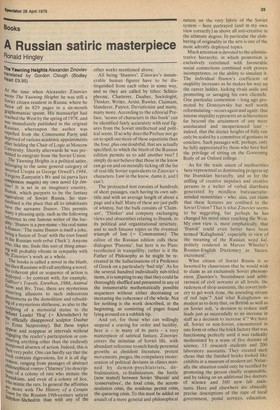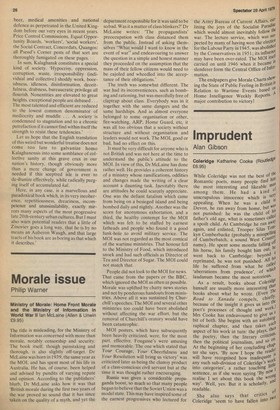A Russian satiric masterpiece
Ronald Hingley
The Yawning Heights Alexander Zinoviev translated by Gordon Clough (Bodley Head 29.95) At the time when Alexander Zinoviev wrote The Yawning Heights he was still a Soviet citizen resident in Russia, where he threw off its 829 pages in a six-month graphomaniac spasm. His manuscript had reached the West by the spring of 1978, and ,,..was immediately published in the original Kussian, whereupon the author was expelled from the Communist Party and deprived of various academic appointments after holding the Chair of Logic at Moscow University. Shortly afterwards he was permitted to emigrate from the Soviet Union. , The Yawning Heights is a political satire, !-'elonging to the same general category of 'nverted Utopia as George Orwell's 1984, Yevgeny Zamyatin's We and (si parva licet et°,t1tPonere magnis) my own novel Up Jen"`„ins! It is set in an imaginary country. 'oansk, which purports to be the fantasy equivalent of Soviet Russia. So standardized is the place that all its inhabitants haVe the surname Ibanov. This permits rnanY a pleasing quip, such as the following reference to one famous writer of the locality: 'Ibanov is a pen-name his real name IbsIbanov.' The name Ibanov is itself a joke, eing a fusion of 'Ivan' with the root found In the Russian verb yebat (luck'). Anyone 110, like me, finds this sort of thing amus Will probably vibrate in sympathy with r Zinoviev's work as a whole. b The books is called a novel in the blurb, mut then Russians will call anything a novel. 'cilo coherent plot or sequence of action is Ployed by contrast with, for example, • aliver's Travels, Erewhon, 1984, Animal arm and We. True, there are mysterious recurring allusions to such indecorous Phenomena as the demolition and rebuilding of a mysterious shithouse, as also to the eUlpting of a memorial statue to the d Pullet Leader 'Hog' (= Khrushchev) by 71e officially disapproved sculptor Dauber Ernst Neizverstny). But these topics ?Pear and reappear at intervals without „ngaging the reader's participation or con41tuting anything other than the endlessly fitl)stPoned absence of action. Indeed, this is b eir very poiht. One can hardly say that the rnok contains digressions, for it is all digsion, ranging from passages of abstract 1r• dosophical vranyo ('blarney') to descrip1,°n8 of a colony of rats who imitate the wut.anskians, and even of a colony of lice, a'° Mimic the rats. In general the affinities pre more with The History of a Certain s,(1),Iv h by the Russian 19th-century satirist itYkov-Shchedrin than with any of the other works mentioned above.
All being `Ibanovs', Zinoviev's innumerable human figures have to be distinguished from each other in some way, and so they are called by titles: Schizophrenic, Chatterer, Dauber, Sociologist, Thinker, Writer, Artist, Bawler, Claimant, Slanderer, Patriot, Deviationist and many, many more. According to the editorial Preface, 'scores of characters in this book' can be identified fairly accurately with real figures from the Soviet intellectual and political scene. If so why does the Preface not go on to spell out more of these equations than the four, plus one doubtful, that are actually specified; to which the blurb of the Russian edition permits us to add another two? I simply do not believe that those in the know can go on and on mentally ticking off the list of real-life Soviet equivalents to Zinoviev's characters. Jam in the know, damn it, and I can't.
The protracted text consists of hundreds of short passages, each having its own subtitle and with an average length of about a page and a half. Many of these are just puffs of whimsy, but the bulk consists of 'Claimant', 'Thinker' and company exchanging views and obscenities relating to Ibansk, to its political and organizational structure, and to such fatuous topics as the eventual triumph of Ism (= Communism). The editor of the Russian edition calls these dialogues 'platonic', but here is no Plato recollected in tranquillity; rather is it the Father of Philosophy as he might be recreated in the hallucinations of a Professor of Greek on a particularly 'bad trip'. As for the several hundred individually sub-titled items, it is tempting to say that they could be thoroughly shuffled and presented in any of the innumerable mathematically possible sequences without either decreasing or increasing the coherence of the whole. Not for nothing is the work described, at the beginning, as consisting of pages found lying around on a rubbish tip.
And yet, for those who can willingly suspend a craving for order and lucidity, here is in many of its parts a very masterpiece of satirical fantasy. Zinoviev covers the minutiae of Soviet life, with abundant reference to such hardy perennial growths as dissident literature, protest movements, purges, the compulsory incarceration of political deviants in clinics manned by demon-psychiatrists, deStalinization, re-Stalinization, the battle (now muted) between Soviet 'liberals' and 'conservatives', the food crisis, the accommodation crisis, the residence permit crisis, the queueing crisis. To this must be added an assault of a more general and philosophical nature on the very fabric of the Soviet system here portrayed (and in my own view correctly) as above all anti-creative in the ultimate degree. In particular the clobbering of originality in the arts is one of the most adroitly deployed topics.
Much attention is devoted to the administrative hierarchy, in which promotion is exclusively correlated with favourable social connections combined with proven incompetence, or the ability to simulate it. The individual Ibanov's coefficient of stupidity increases as he makes his way up the career ladder, kicking rivals aside and promoting or savaging his own clientele. One particular contention long ago promoted by Dostoyevsky but well worth reformulating recurs again and again: that intense stupidity represents an achievement far beyond the attainment of any mere uneducated and inexperienced lout indeed, that the dizzier heights of folly can only be scaled by a committee of geniuses in conclave. Such passages will, perhaps, only be fully appreciated by those who have had the privilege of sitting on the Governing Body of an Oxford college.
As for the trade union of mediocrities here represented as dominating progress up the Ibanskian hierarchy, and as for the stifling of creative impulses and creative persons in a welter of verbal diarrhoea generated by mindless bureaucraticminded nonentities who, alas, can claim that these features are confined to the Soviet Union? That is what Zinoviev seems to be suggesting, but perhaps he has changed his mind since reaching the West. My own view is, most emphatically, that lbansk' could even better have been termed `Kalaghansk', especially in view of the meaning of the Russian word kal. politely rendered in Marcus Wheeler's Russian-English Dictionary as 'faeces. excrement'.
What citizen of Soviet Russia is so besotted by chauvinism that he would wish to claim as an exclusively Soviet phenomenon Zinoviev's 'boorishness and arbitrariness of civil servants at all levels, the rudeness of shop assistants, the covert bribery to get work done, the unending stream of red tape'? And what Kalaghanov so modest as to deny that, on British as well as on Soviet soil, 'a decision to reduce staff leads just as successfully to an increase in staff as a decision to increase it'? We have all. Soviet or non-Soviet, encountered in one form or other the brick factory that was functioning perfectly until it was radically modernized by a team of five doctors of science, 15 research students and 200 laboratory assistants. They created such choas that the finished bricks looked like exhibits in a museum of modern art. Naturally the situation could only be rectified by promoting the person chiefly responsible, and by taking on an additional five doctors of science and 300 new lab assistants. Here and elsewhere are clinically precise descriptions of the rape of local government, postal services, education, beer, medical amenities and national defence as perpetrated in the United Kingdom before our very eyes in recent years. Price Control Commissions, Equal Opportunity Boards, 'workers', 'social workers', the Social Contract, Concordats, Quangos: all Pseud's Corner pests of that sort are thoroughly fumigated on these pages.
In sum, Kalaghansk constitutes a special kind of society. 'Hypocrisy, oppression, corruption, waste. irresponsibility (individual and collective) shoddy work, boorishness, idleness, disinformation, deceitfulness. drabness. bureaucratic privilege all flourish. Nonentities are elevated to great heights, exceptional people are debased. . . The most talented and efficient are reduced to the lowest common denominator of mediocrity and muddle . . . A society is condemned to stagnation and to a chronic putrefaction if it cannot find within itself the strength to resist these tendencies.'
Let us hope that the English translation of this weird but wonderful treatise does not come too late to galvanize homo Kalaghanensis into some semblance of collective sanity at this grave crux in our nation's history, though obviously more than a mere change of government is needed if this sceptred isle is ever to de-ibanize effectively, while radically purging itself of accumulated kal.
Here, in any case, is a marvellous and paradoxical book which, in its very incoherence. repetitiousness, dreariness, incompetence and unassimilability, exactly mirrors many aspects of the most progressive late 20th-century urban cultures. But! must also warn potential readers that a little of Zinoviev goes a long way, that he is by no means an Auberon Waugh, and that large tracts of his book are as boring as that which it describes.'







































 Previous page
Previous page